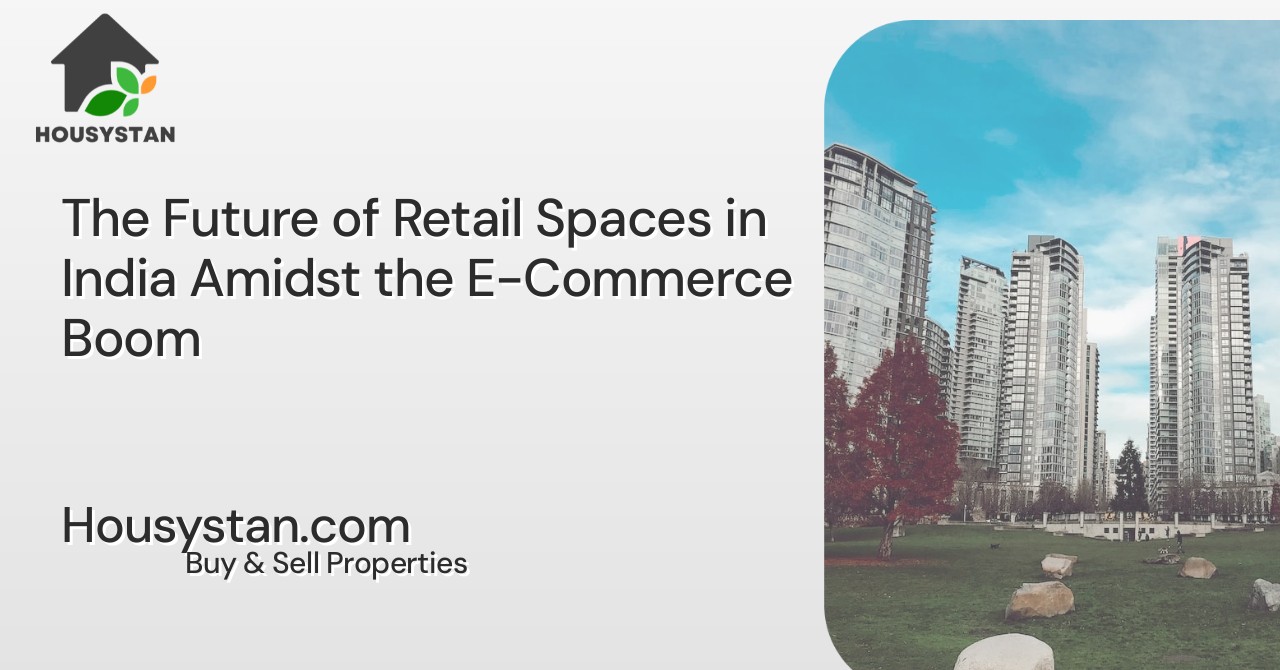The Future of Retail Spaces in India Amidst the E-Commerce Boom
Read latest blogs and articles from Housystan

The Information mentioned here was last updated on:
29/1/2026The Future of Retail Spaces in India Amidst the E-Commerce Boom
The retail landscape in India is transforming rapidly as the e-commerce boom dramatically reshapes consumer habits. Traditionally, bustling marketplaces and opulent malls have defined the retail experience in India. Yet, with the advent of online shopping, there's an undeniable shift underway. Despite the convenience of digital shopping, physical retail spaces in India remain significant. They are evolving to adapt to this digital era, offering a glimpse into the future of shopping in the country.
The Rise of E-Commerce in India
- Verified Tenants/Buyers
- Unlimited Property Listing
- Zero subscription/charges fee
Over the last decade, India has seen a substantial surge in e-commerce activity. Market giants such as Amazon and Flipkart have gained prominence, capitalizing on the nation’s huge internet user base. By offering a wide assortment of products, competitive pricing, and swift delivery services, these platforms have carved a niche in the Indian market.
According to reports, e-commerce in India is projected to grow rapidly, largely driven by increased smartphone usage and improved internet connectivity. This digital shopping trend has led to a shift in consumer behavior, with more people opting for the convenience of shopping from the comfort of their homes.
Challenges Facing Traditional Retail Spaces
The shift towards online shopping presents several challenges for traditional retail spaces. Brick-and-mortar stores, which were once the lifeline of retail, are confronting declining foot traffic. Many consumers find shopping online more convenient and time-saving.
Moreover, operational costs such as rent, utilities, and staffing for physical outlets often outweigh those of running an online store. This economic strain leads some retailers to reconsider their presence in physical spaces, potentially leading to store closures.
Adapting to Changing Consumer Preferences
Retail spaces in India are adapting to these changes by focusing on understanding consumer preferences and enhancing the shopping experience. Retailers are tapping into technology to create engaging and interactive experiences. With augmented reality and virtual reality, shoppers can visualize products in their homes, offering a blended physical and digital experience.
Moreover, physical stores are shifting from being merely transactional spaces to experiential centers. Many are offering personalized services, hosting events, and creating community spaces within their stores to draw people in and keep them engaged.
The Advent of Omnichannel Retailing
Amidst the e-commerce rise, omnichannel retailing emerges as a savior for traditional retail spaces. Retailers are combining online and offline channels to create a seamless customer experience. An omnichannel strategy allows consumers to start their shopping journey online and complete it in-store, or vice versa. This approach not only enhances convenience but also maintains a connection between physical stores and digital platforms.
Retailers are investing in technology to better manage inventory, offer click-and-collect services, and enhance customer interactions across all touchpoints. This blended approach helps maintain customer loyalty in an increasingly competitive market.
Emergence of Smaller and Niche Stores
Another trend arising from the e-commerce boom is the development of smaller, more specialized stores that target specific customer segments. These niche stores offer curated selections and specialized services, catering to distinct tastes and preferences. They differentiate themselves from larger online marketplaces by providing unique in-store experiences and personalized service.
These stores are also leveraging social media and digital marketing to connect with potential customers, using targeted campaigns to attract specific demographics.
Reimagining Malls as Lifestyle Hubs
Shopping malls, once vibrant centers bustling with shoppers, are reimagining their role in the retail landscape. They are transforming into lifestyle hubs, incorporating entertainment, dining, and socialization spaces to attract footfall. By creating a mixed-use environment, malls are becoming destinations for not just shopping but for leisure and social activities as well.
The inclusion of cinema halls, food courts, interactive gaming zones, and fitness centers complements the retail offerings, providing a comprehensive lifestyle experience. This transformation helps malls remain relevant in a world where online shopping is increasingly dominant.
Investing in Technology and Data Analytics
Retailers in India are now investing heavily in technology and data analytics to enhance operations and customer understanding. By analyzing consumer data, retailers can tailor their offerings and fine-tune marketing strategies. This data-driven approach enables retailers to respond swiftly to changing market trends and consumer behavior.
Technology also facilitates inventory management, reducing overheads, and increasing efficiency. With insights into purchasing patterns and preferences, retailers can optimize product assortments, ensuring customers find what they seek, while minimizing unsold stock.
Sustainability and Ethical Retailing
Increasingly, Indian consumers are becoming conscious of sustainability and ethical considerations in retail. Physical retail spaces are responding by adopting sustainable practices to attract eco-conscious shoppers. This includes using eco-friendly materials in-store design, reducing waste, and supporting local artisans and sustainable brands.
Retailers that commit to ethical practices often find greater loyalty among customers who share these values. By incorporating sustainability into their business model, retailers can differentiate themselves in a crowded market, appealing to a growing segment of environmentally aware consumers.
Conclusion: Continuous Evolution in the Retail Sector
The Indian retail sector is undoubtedly at a crossroads. While e-commerce continues to grow, physical retail spaces hold their ground by adapting and evolving. Innovation, technology integration, and a focus on the customer experience are key to their future success. The interplay between online convenience and offline experiences will likely define the future shopping landscape, ensuring that retail spaces in India remain vibrant and relevant amidst the ongoing digital revolution.